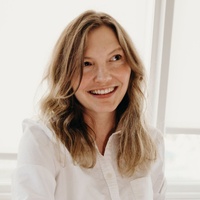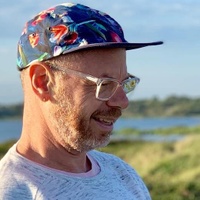So, am I a writer yet?
Prelude
Caits Meissner is the author of the illustrated hybrid poetry book Let It Die Hungry (The Operating System, 2016). Her latest projects include the DIY comix poetry zine Pep Talks For Broke(n) People and a comix vignette series, New York Strange, publishing monthly in Hobart journal throughout 2020. She currently is the inaugural Palette Poetry Second Book Fellow and spends her days as the Prison and Justice Writing Program Director at PEN America.
Conversation
So, am I a writer yet?
A pep talk for anyone struggling to embody the identity of "writer," by poet, artist, and writer Caits Meissner.
As told to Caits Meissner, 1369 words.
Every now and then I purposefully stretch my brain into the difficult and somehow comforting knowledge that none of what happens in my small blip of a lifetime matters in the large lens of the infinite. While this profound fact momentarily snaps me into a perspective of non-attachment and gratitude, the exercise is a touch-and-go endeavor. I always need to remind myself—with frequency and the gumption to push past doubt—of the wondrous brevity of our individual lives, and the value of the present moment.
I remind myself of the infinite to tame down my monstrous ego, usually in the face of a single recurring question: Am I a writer yet?
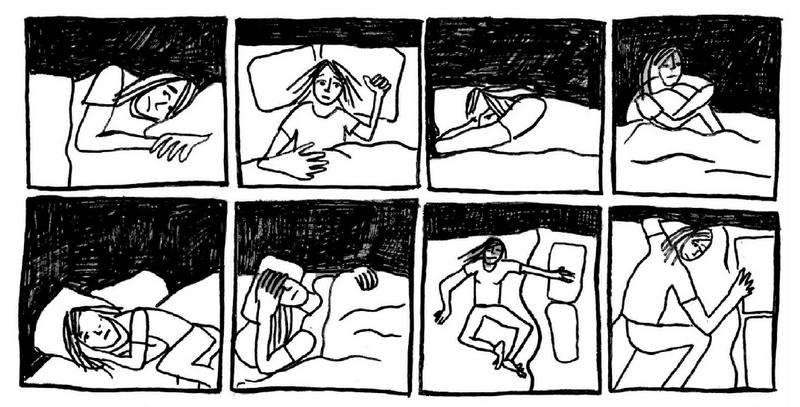
Image from comic “Summertime” from Pep Talks For Broke(n) People
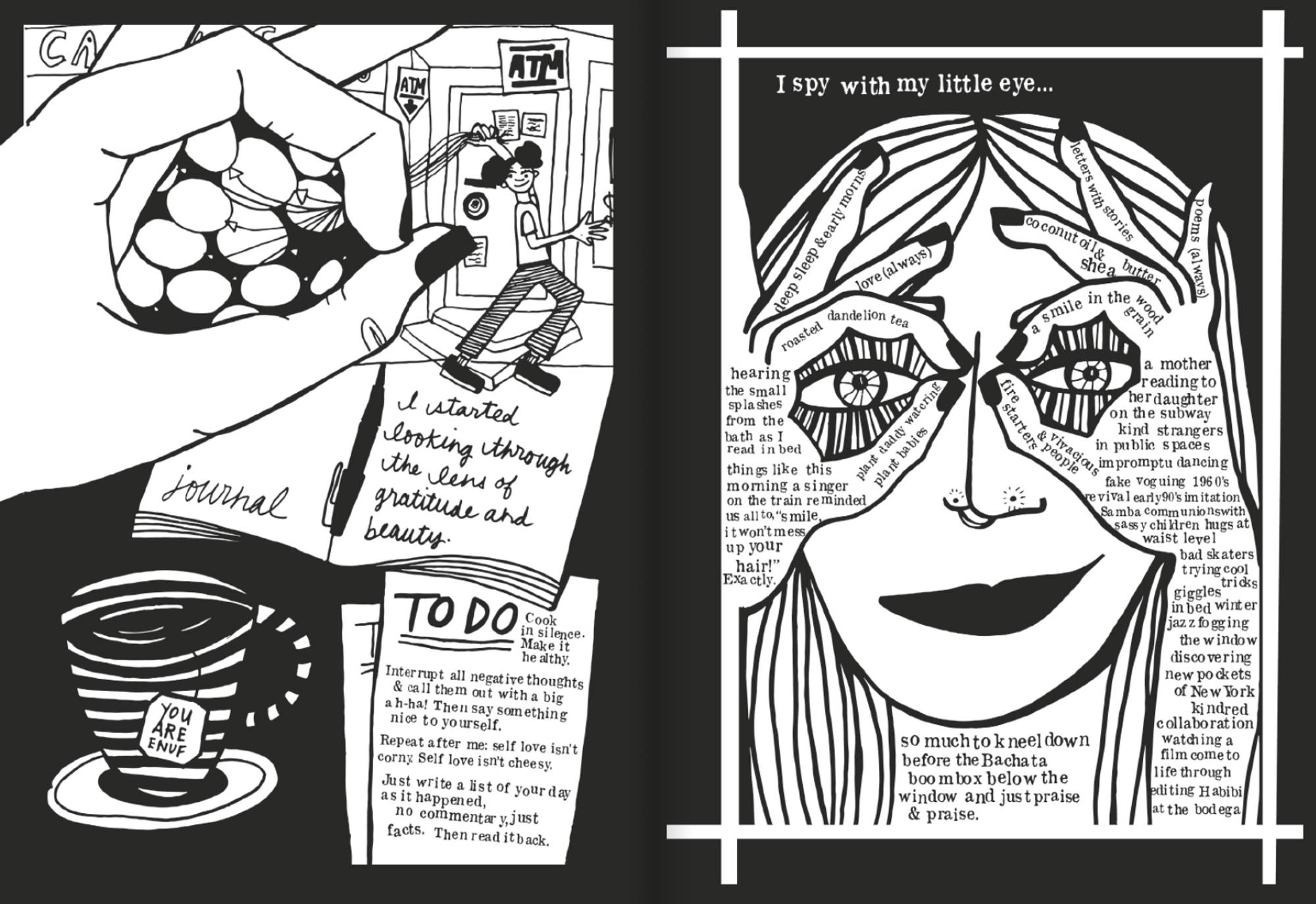
From “How I Got Out” from Pep Talks For Broke(n) People
I’ve given a great deal of thought to what makes a writer, my many selves sharing their loudmouth answers. My most romantic self will tell you that I admire the outlier—those who wrap themselves in the honest work of writing and don’t have social media, not because they are pretentious and holier-than-thou, but because they just truly don’t care. It is this lack of caring that obviously propels the genius. My superficial self will share that she thinks one is only a writer when humbly famous, and thus, she feels a sense of envy towards those who have reached that goal and she probably won’t ever, so why bother at all. My professional self finds value in uplifting the work of others, and feels emboldened by her role in pushing other’s careers forward. My practical self will admit to craving the time and resources that come with fellowships and residencies because that support would put me in deeper contact with my creative inner life and/or a step closer to finishing my projects. And then my superficial self pops up waving a little flag that says, “and don’t forget you‘d get validation!”
All of these selves are true (annoyingly so), and all of these thoughts happen and will, in all likelihood, persist in happening. But here’s the exciting news:
I write. Through it all. That’s what makes me a writer. That’s pretty much it.
I sat on a panel this summer for the Emerging Writers festival in Alexandria, Virginia and gave a handful of potentially useful tips for applying to fellowships, grants, and residencies—after all, I oversee a fellowship as part of my job. Among other points, I shared that fellowships and resources are helpful because they offer a little sustenance and space and capacity and support, and boost your profile in the world, which hopefully means more readers, more community, and an increased ability to feed and clothe yourself.
But, and this is just as important, I do not think these opportunities offer magical access to the life or identity of a writer. That comes from the act itself, from the commitment to the creative process, the one good goddamn thing that everyone knows but is reluctant to admit to themselves:
There is no way around pen on paper. No accolade will relieve you from the hard work of showing up. There is no shortcut.
I am certainly not suggesting in any way that you should abstain from giving applications for such resources a go—please do apply. But also, in the phrase of many-a-great tweeting writers intent on demystifying their success, “I don’t know who needs to hear this but…,” please do yourself a favor and don’t hang your self worth or the value of writing or the value of YOUR writing on its flimsy hook.
When I think about the closest I’ve come to hovering in that starry state for an extended period—where I am relieved of modern life’s exhausting duties, where manmade time melts away and what’s left is a great sea of energy I’m suspended in—is when I’m in that delicious flow of creation. And maybe reading this you recognize yourself because you, like me, remember a time when access to that flow was abundant and nourishing and clean and your reasons for creating were so pure they didn’t ever have need for soap.
Maybe you, like me, then learned somewhere along the line that your art could also make you feel good when someone else enjoyed it. And the value attached to your creativity increased. But only for a moment. And because that moment was fleeting, chasing the feel-good became addictive. The process of seeking validation became wrapped up in your larger identity, and what you create (and how people respond) became confused with the very facts of who you are.
Maybe then, that infinite ocean of effortless flow became harder to find—which cave do I swim under, again? And so on and so forth and the advent of social media and blah blah social capital in who you know and how you flaunt it, and suddenly writing isn’t a place to escape or visit to understand yourself more intimately, or to examine and chase after elusive truths, but a landmine of anxiety and a veritable slot machine of different combos and flavors of attacks on your self worth.
And ta da, you grew up to be a regular human, and how disappointing is that?
But also, how freeing.
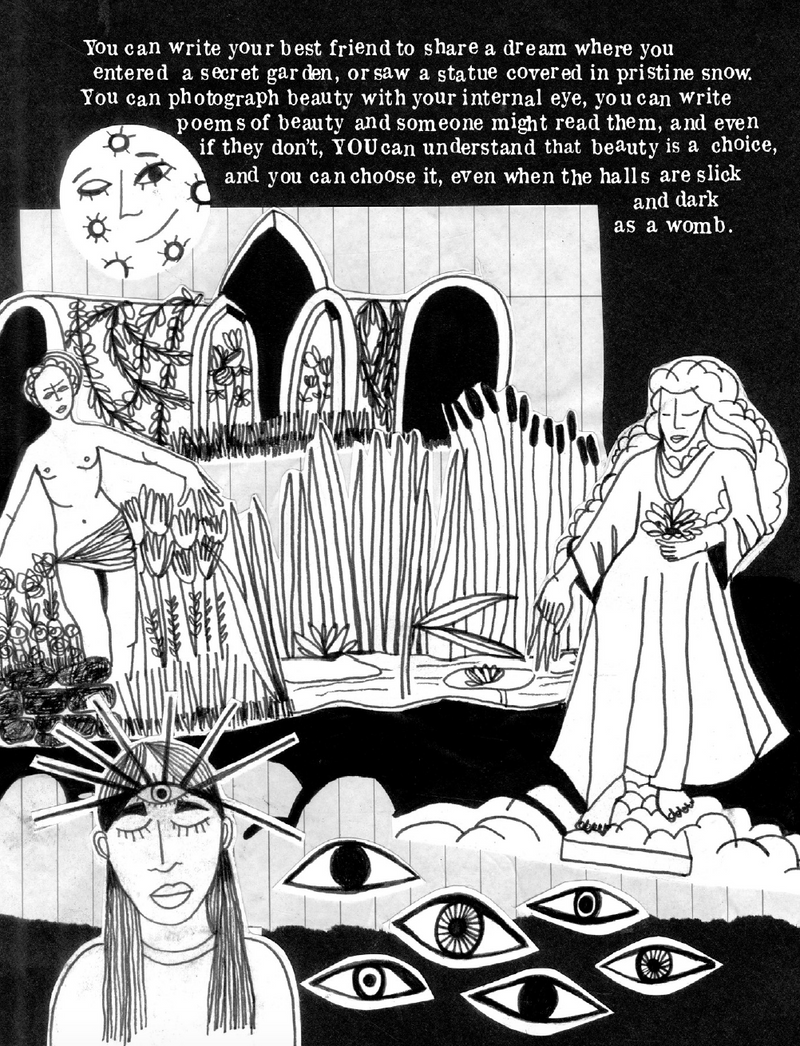
From “You Can’t Have It All” from Pep Talks For Broke(n) People
What gives me my spark (and self worth and steady ground and the possibility for living in the infinite) back is the knowledge that there are so many ways to be a writer in this world—so many alternatives to the popular narrative, as diverse as humanity itself.
For example, I just about leapt outta my skin when Cindy Crabb, who wrote and published the exceptional Doris zine on a photocopier for all those years, followed me on Instagram—and I had no one to turn to and tell because, though she is important to a great many of us in the zine underground, who the hell in my literary office would know Cindy Crabb?
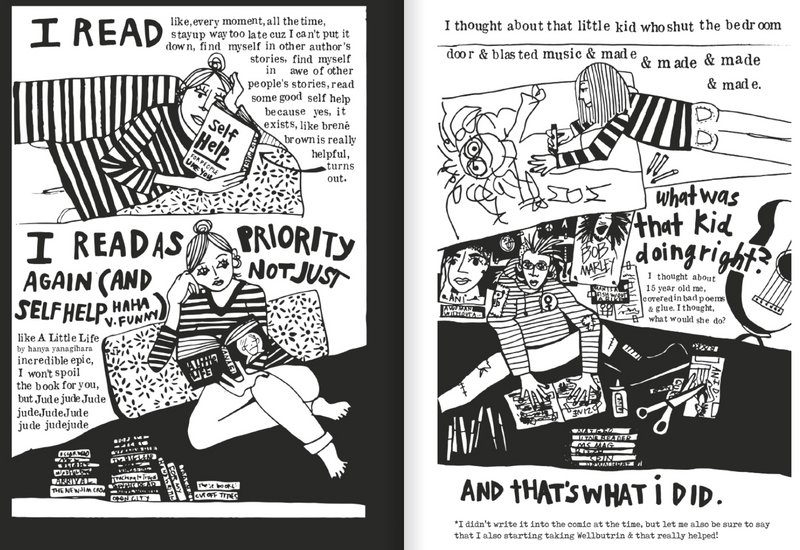
From “How I Got Out” from Pep Talks For Broke(n) People
Or how about when I recently learned of an acquaintance who stole away some vacation days, took up a dog/house sitting job in the woods, and that became a week-long writing residency. Another admitted to me that he writes at his job—primarily because he works an excessive amount of unpaid overtime, and is the big boss anyway, so therefore, of course he’ll write at his catch-all desk. Others take online classes to generate new material without breaking the bank on an MFA. My own book is on a small press, The Operating System, that resists capitalism and is turning more cooperative by the day. I write a poem a day during National Poetry Month each April with a group of eight fellow women writers over email. Much of my work happens in the great writing studio called the New York City subway system.
Of course, the great trick of the universe is that the infinite space we’re seeking is, in fact, what we’re made of. It won’t come from out there, it comes from in here. Here’s the charge: carve your own context for the act of writing. Because even if you get those residencies and fellowships, when they conclude, you’ll inevitably fall right back into your very own hands.
Here’s a mantra that you can give a try when you’re sliding into the despair that comes from rejection anxiety and have lost the map. Take a deep breath…
My creativity is endless and so am I.
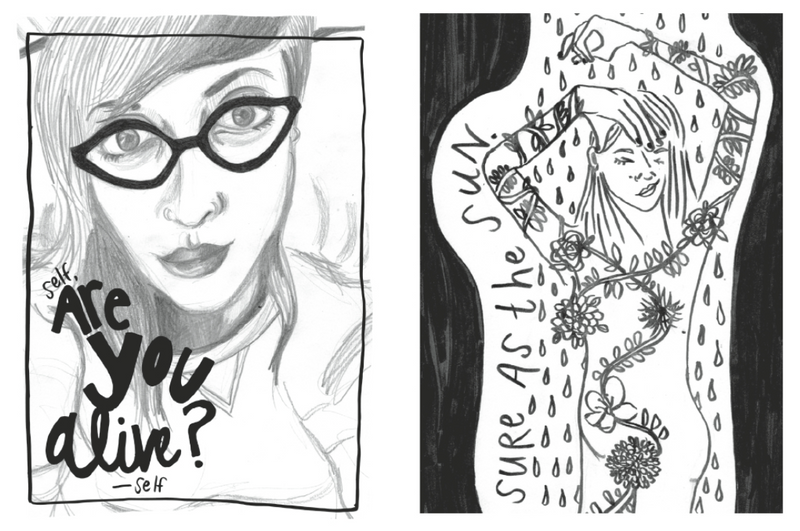
From “On Optimism” from Pep Talks For Broke(n) People
Editor’s note: This essay was originally published in Caits’ DIY comix poetry zine, Pep Talks for Broke(n) People, and was adapted for publication. All comics included in this essay are also by Caits.*
- Name
- Caits Meissner
- Vocation
- Writer, Poet, Artist
Some Things
Pagination
